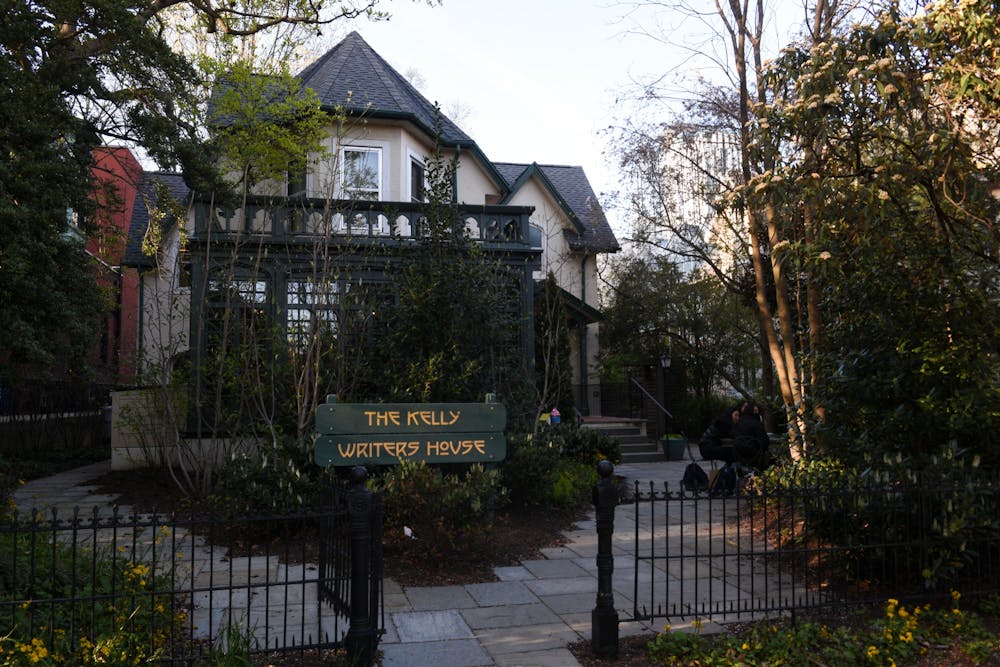This Wednesday and Thursday, Penn will host a climate storytelling event series including a reading and interactive program with climate storyteller and journalist Devi Lockwood and workshops led by Cosmic Writers.
“Listen Up! Climate Storytelling with Devi Lockwood” is a two-day program that will be presented by My Philadelphia Climate Story — a public research project directed by the Penn Program in Environmental Humanities — and the Kelly Writers House. Participants in the project — nine teachers and their students who attend high schools across the city — will be able to meet for the first time during the program and engage in climate storytelling activities together.
On Wednesday, the Kelly Writers House will host Lockwood for a reading and reception. The next morning, Lockwood will lead an interactive program in the Irvine Auditorium. After that, students will be able to attend a writing workshop led by Cosmic Writers based on their unique interests, with titles ranging from “Flash Floods and Flash Fiction” to “Nature Poetry” to “Climate Journalism.”
Bethany Wiggin, PPEH founding faculty director and professor of German Languages and Literature, founded My Philadelphia Climate Story in 2020 after realizing how the rising sea level was impacting the health of trees on the Maine shoreline, where she grew up.
“I started thinking, ‘What if we could help more people recognize the way that climate change is affecting their lives?’” Wiggin said.
The My Climate Story team — comprised of Wiggin and three undergraduate PPEH interns — built a storytelling curriculum as a campaign to document and share the climate impact stories of students living in Philadelphia. While they couldn’t visit local schools in person during the pandemic, they designed workshops and an online workbook teaching high school students how to write and have conversations about climate change.
Wiggin emphasized the importance of incorporating climate change education into humanities as well as science classes.
“I think literature and other arts have an incredible value as companions to the hard numbers of climate change,” Wiggin said, “because they help us understand the emotion, why the numbers matter from humans’ perspective.”
RELATED:
Maya activists to speak about Indigenous rights at the Perry World House on Oct. 11
Nearly a month in, Fossil Free Penn’s encampment continues despite harsh weather conditions
To show this perspective, the My Climate Story team developed a storybank where individuals can submit their personal experiences with climate change. The stories spanned 15 different languages and over 20 countries. The team also filmed a documentary where high school teachers and Penn professors and students discussed their views on the effects of climate change.
This year, My Climate Story is partnering with nine Philadelphia high schools to research, document, and share climate stories of the city. The team chose nine teachers who teach a wide range of subjects — ranging from history to biology — to reflect the project’s transdisciplinary focus. Four PPEH interns — College sophomore Emma Davey, 2022 Graduate School of Education graduate Emma Fogel, College senior Ikym Simon, and 2022 College graduate Rachel Swym — spent the summer documenting each school’s unique environmental challenges.
The campaign is funded by Penn’s SAS Making a Difference Grant for addressing societal issues at a local, national, and international level.
“The goal was to look at where the schools are with fresh eyes, and also see how the building itself interacts with climate change,” Davey said. “How those students are going to interact with climate change in a curriculum is going to be very different.”
Over the 2022-2023 academic year, My Climate Story will also work with Cosmic Writers to bring workshops to partner schools. Cosmic Writers is a nonprofit organization, founded by 2022 College graduate Rowana Miller, which provides creative writing education to K-12 students. The instructors, who are undergraduate students, will be leading workshops at the “Listen Up!” event on Oct. 13, covering several genres — reflective memoir, poetry, fiction, and journalism.
Starting in November, Cosmic Writers will also be working with selected high school student ambassadors for a year-long intensive workshop, culminating in a climate storytelling festival in the spring.
The goal of the workshop is to “bring together those students, work with them on their writing to prepare for the festival, and generally give them a sense of themselves as the people who are writing about how climate change is shaping the lives of teenagers in Philadelphia,” Miller said.
Last spring, the My Climate Story team introduced the project to the Philadelphia mayor with the support of the Penn Office of Sustainability. They will return to the City Council this spring, where the climate classrooms from each school will present their stories.
Wiggins said that by sharing the diverse climate impacts in their communities, students from the climate classrooms can draw attention to the need for climate justice in local education and physical infrastructure.
While the gathering will center My Climate Story participants, Wiggin emphasizes that everyone is welcome.
“Climate touches everything,” Wiggin said. “We all have a climate story.”









